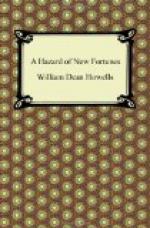A waiter came round with cigars, and Fulkerson took one. “Ah,” he said, as he bit off the end, and leaned over to the emblematic masterpiece, where the brandy was still feebly flickering, “I wonder if there’s enough natural gas left to light my cigar.” His effort put the flame out and knocked the derrick over; it broke in fragments on the table. Fulkerson cackled over the ruin: “I wonder if all Moffitt will look that way after labor and capital have fought it out together. I hope this ain’t ominous of anything personal, Dryfoos?”
“I’ll take the risk of it,” said the old man, harshly.
He rose mechanically, and Fulkerson said to Frescobaldi’s man, “You can bring us the coffee in the library.”
The talk did not recover itself there. Landau would not sit down; he refused coffee, and dismissed himself with a haughty bow to the company; Colonel Woodburn shook hands elaborately all round, when he had smoked his cigar; the others followed him. It seemed to March that his own good-night from Dryfoos was dry and cold.
VII.
March met Fulkerson on the steps of the office next morning, when he arrived rather later than his wont. Fulkerson did not show any of the signs of suffering from the last night’s pleasure which painted themselves in March’s face. He flirted his hand gayly in the air, and said, “How’s your poor head?” and broke into a knowing laugh. “You don’t seem to have got up with the lark this morning. The old gentleman is in there with Conrad, as bright as a biscuit; he’s beat you down. Well, we did have a good time, didn’t we? And old Lindau and the colonel, didn’t they have a good time? I don’t suppose they ever had a chance before to give their theories quite so much air. Oh, my! how they did ride over us! I’m just going down to see Beaton about the cover of the Christmas number. I think we ought to try it in three or four colors, if we are going to observe the day at all.” He was off before March could pull himself together to ask what Dryfoos wanted at the office at that hour of the morning; he always came in the afternoon on his way up-town.
The fact of his presence renewed the sinister misgivings with which March had parted from him the night before, but Fulkerson’s cheerfulness seemed to gainsay them; afterward March did not know whether to attribute this mood to the slipperiness that he was aware of at times in Fulkerson, or to a cynical amusement he might have felt at leaving him alone to the old man, who mounted to his room shortly after March had reached it.
A sort of dumb anger showed itself in his face; his jaw was set so firmly that he did not seem able at once to open it. He asked, without the ceremonies of greeting, “What does that one-armed Dutchman do on this book?”
“What does he do?” March echoed, as people are apt to do with a question that is mandatory and offensive.




